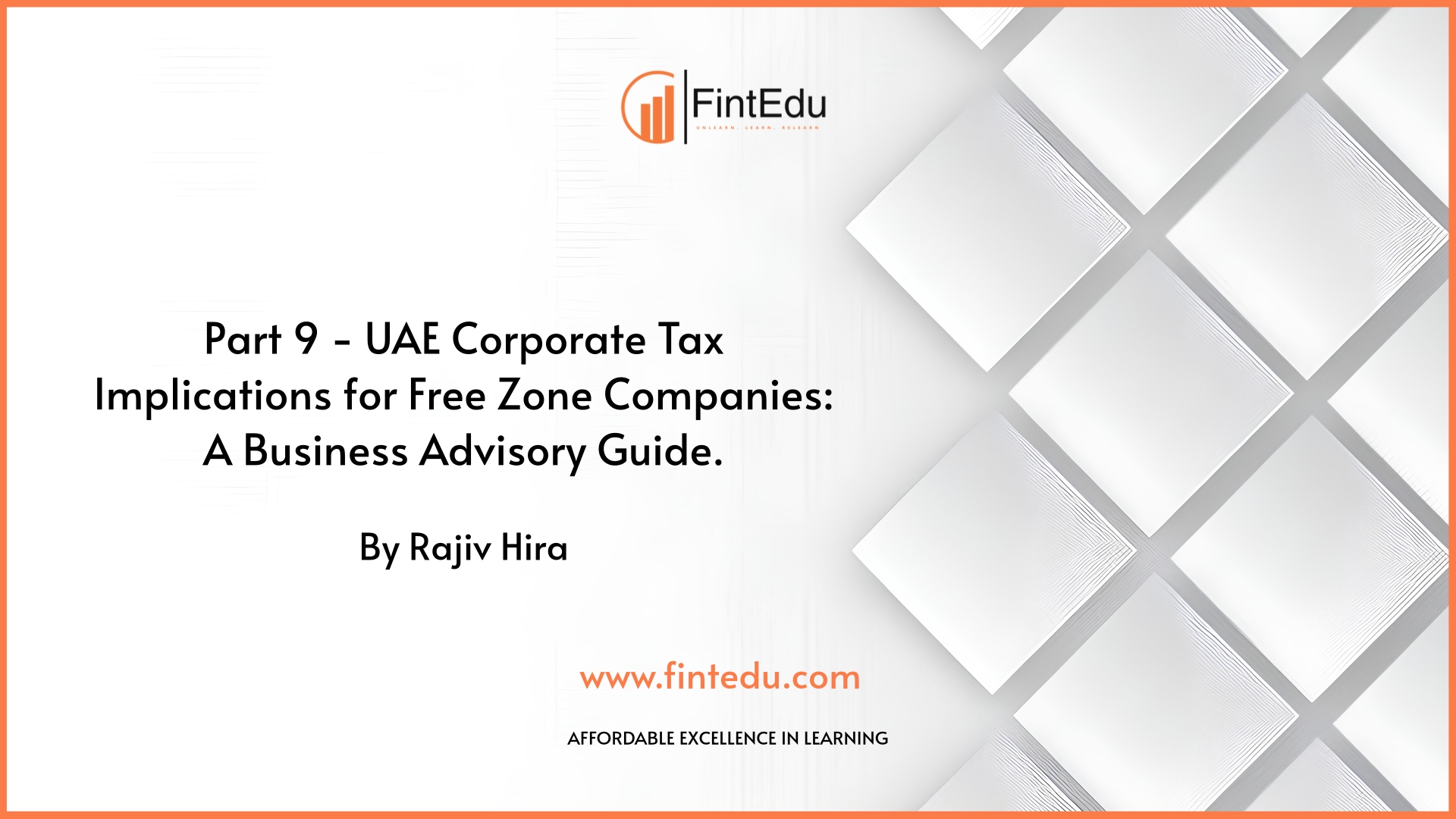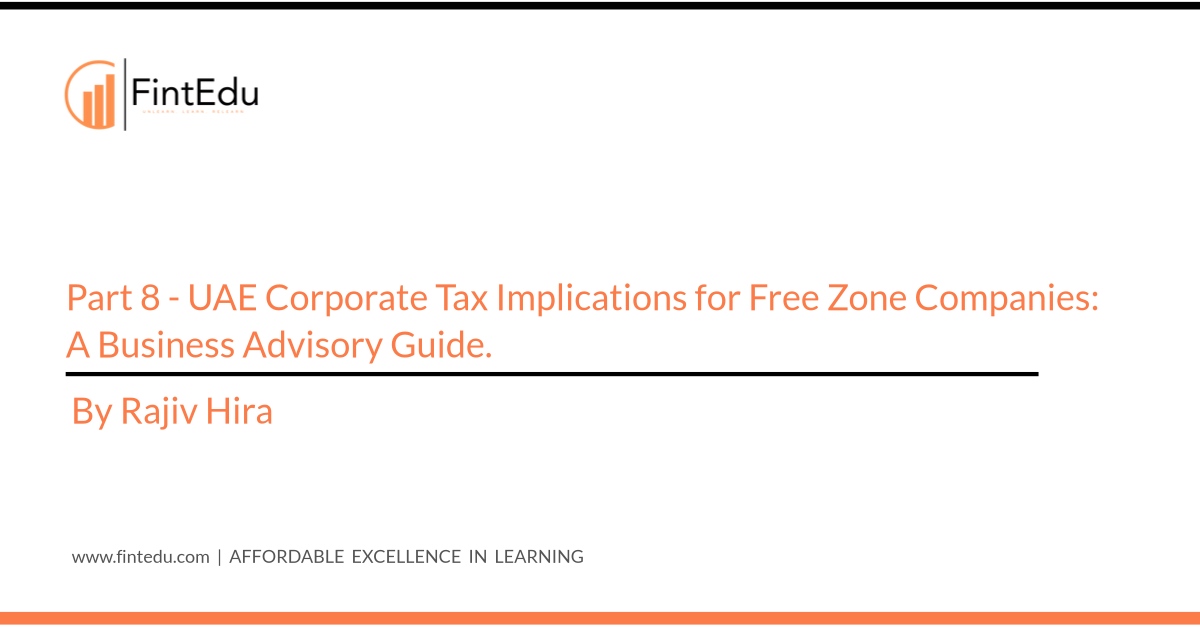LISTEN TO THE ARTICLE
Free Zone and within that Designated Zone, were always an interesting and important aspect of United Arab Emirates economy. In 2018 VAT Legislation gave us an important aspect of Designated Zone, and now Corporate Tax in 2023, is bringing an important aspect for obtaining benefit of Qualifying free zone income. To align the aspects of Corporate Tax, it’s also important to realign and revisit the VAT aspects applicable for Designated Zone and connect the dots of free zone and designated zone in particular.
Background
The Federal Tax Authority (FTA), a regulatory body for administrating Value Added Tax, was established under Federal Law by Decree No. 13 of 2016. The authority takes charge of managing and collecting federal taxes and related fines, as well as distributing tax-generated revenues and applying the tax-related procedures in the UAE.
The authority's Chairman is His Highness Sheikh Hamdan bin Rashid Al Maktoum Deputy Ruler of Dubai, and the UAE Minister of Finance, while His Excellency Khalid Al Bustani is the Director General of FTA.
What is Value Added Tax?
Value Added Tax (or VAT) is an indirect tax (also referred to as a consumption tax). VAT is charged at each step of the "supply chain". Ultimate consumers generally bear the VAT cost while businesses collect and account for the tax, in a way acting as a tax collector on behalf of the government.
It;s important to differentiate in financial terms:
- For Business, generally VAT is a Balance Sheet Item i.e. it is reflected in payable or receivable position;
- For Individual (end user or unregistered taxable person), it is a profit and loss item i.e. it goes into an expense line.
On a lighter note, businesses act as an outsourcing VAT collecting agent of the government. i.e. business pays the government the tax that it collects from the customers while it may also receive a refund from the government on tax that it has paid to its suppliers. The net result is that tax receipts to the government reflect the "value add" throughout the supply chain.
VAT implementation in the UAE on 01 January 2018 at 5%
The UAE Federal and Emirate governments provide citizens and residents with many different public services - including hospitals, roads, public schools, parks, waste control, and police services. These services are paid for using government budgets. VAT provides UAE with a new source of income, contributing to the continued provision of high quality public services in the future. It also helps the government move towards its vision of reducing dependence on income derived from oil and other hydrocarbons. VAT was introduced across the UAE on 1st January 2018 at a standard rate of 5%.
What is the implication on VAT for business having establishment (licensee) in Free Zone?
The UAE has a number of free zones across the Emirates i.e. Dubai,AbuDhabi,Sharjah,Fujairah,Ajman,Ras-Al-Khaimah and Umm-Al-Quwain.
Free zones may be broadly categorized as financial free zone, seaport free zones, airport free zones, and mainland free zones. There are multiple and long-lasting exemptions provided which includes:
- 100% foreign ownership
- 100% import and export tax exemptions
- 100% repatriation of capital and profits
- Exemption from corporate /personal Income tax
Each Free Zone is designed around one or more business industry categories and only offers licenses to companies within those categories. In these free zones, businesses / Investors can either register a new company in the form of a:
- Free Zone Establishment (FZE)
- Free Zone Company (FZC)
- Establish a branch or representative office of their existing or parent company based within the UAE or abroad
- Other forms like Special Purpose Vehicle / Company, Foundation etc., based on Free Zone regulations.
Free Zones are important and integral part of UAE economy for promoting international trade, domestic production, assembly units and so on. To make this attraction intact, important provisions were considered and adopted in the process of introduction of Value Added Tax:
- Classification of Special Economic Zone (Designated Zone) for tax benefit - There are provisions introduced in the Value-Added-Tax Law, where 25 Free Zones are classified as Designated Zones. Although Designated Zones are part of the United Arab Emirates territory, for Value-Added-Tax purposes, these Designated Zones are treated as being outside the United Arab Emirates. This will imply that no Value-Added-Tax is charged on the transactions for import of goods in these Designated Zones, supply of goods within the Designated Zone or between the Designated Zone, with some exceptions noted.
- What makes a Free Zone to be classified as a Designated Zone (Special Economic Zone)? - Any Designated Zone specified by a decision of the Cabinet shall be treated as being outside the State and outside the Implementing States, subject to the following conditions:
- The Designated Zone is a specific fenced geographic area and has security measures and Customs controls in place to monitor entry and exit of individuals and movement of goods to and from the area.
- The Designated Zone shall have internal procedures regarding the method of keeping, storing and processing of Goods therein.
- The operator of the Designated Zone complies with the procedures set by the Authority.
Note: Cabinet approval is received for 25 Free Zones, classified as Designated Zones.
Designated Zone category is for Goods trading (not for service business) - Designated Zone category is only for Goods, and services are not included in the scope. i.e. Goods may NOT be subject to Tax when traded or transacted from Designed Zone, however no special treatment is applicable for service business.
For SERVICE sector / industry - The place of supply of services are taxed in accordance with the general VAT rules, with no special treatment for Designated Zone entities.
For GOODS – It's quite interesting to analyze the transactions and its implications:
The transfer of Goods between Designated Zones shall not be subject to Tax if the following two conditions are met:
· Where the Goods, or part thereof, are not released, and are not in any way used or altered during the transfer between the Designated Zones,
· Where the transfer is undertaken in accordance with the rules for customs suspension according to GCC Common Customs Law.
Where Goods are moved between Designated Zones, the Authority may require the owner of the Goods to provide a financial guarantee for the payment of Tax, which that Person may become liable for should the conditions for movement of Goods not be met.
Transfer of goods between two Designated Zones will be treated as outside the scope of VAT subject.Since the place of supply for goods generally follows the location of the goods, a supply of goods between Designated Zone is treated as made outside the UAE. This means that the default position is that such supplies are not subject to UAE VAT.
Important point: In this case, sale of goods between designated zone, where goods are not moved out of the custom suspension, will not be subject to tax & may be treated as "Out-Of-Scope" transaction.
Where a supply of Goods is made within a Designated Zone to a Person to be used by him or a third person, then the place of supply shall be the State unless the Goods are to be incorporated into, attached to or otherwise form part of or are used in the production or sale of another Good located in the same Designated Zone which itself is not consumed.
Supply of goods within a Designated Zone "under custom bonded area" - Since the place of supply for goods generally follows the location of the goods, a supply of goods within a Designated Zone is treated as made outside the UAE. This means that the default position is that such supplies are not subject to UAE VAT.
Important point: In this case, sale of goods within designated zone, where goods are not moved out of the custom suspension, will not be subject to tax & may be treated as "Out-Of-Scope" transaction.
Import of Goods in Designated Zone will be treated as outside the scope of VAT subject.Since the place of supply for goods generally follows the location of the goods, a supply of goods from outside the world to Designated Zone, is treated as made outside the UAE. This means that the default position is that such supplies are not subject to UAE VAT.
Supply of goods from outside the world to Designated Zone "under custom bonded area" i.e. custom is not paid. Since the place of supply for goods generally follows the location of the goods, a supply of goods in a Designated Zone is treated as made outside the UAE. This means that the default position is that such supplies are not subject to UAE VAT.
Important point: In this case, import of goods from outside the world to designated zone, where goods are not moved out of the custom suspension, will not be subject to tax & may be treated as "Out-Of-Scope" transaction.
What if a Designated Zone company sells goods to the mainland entity in UAE, should the Designated Zone company charge VAT or will be considered as "Out-Of-Scope" transaction from VAT:
Scenario A: Goods are imported (custom cleared) by Mainland Company
VAT Applicability by Designated Zone Company: In this case, considering Designated Zone company sold goods within designated Zone, will be considered as Out-Of-Scope Transaction for Designated Zone Company.
VAT Applicability by Mainland Company: In this case, considering Mainland Company took possession of goods in Designated Zone, and imported goods using their import code (i.e. custom paid), will be treated as importing goods in UAE & will be subject to tax under Reverse Charge Mechanism (RCM).
Scenario B: Goods are imported (custom cleared) by Designated Zone Company
VAT Applicability by Designated Zone Company: In this case, considering Designated Zone Company imported goods using their import code (i.e. custom paid), will be treated as importing goods in UAE & will be subject to tax under Reverse Charge Mechanism (RCM). On RCM applicability, goods will be treated as in UAE.
Note: In this case, although goods are physically located in Designated Zone, custom paid goods are treated as in UAE for VAT treatment. i.e. the reason it's important for Business operating in Designated Zone to clearly segregate:
- Custom Duty Paid Goods, and
- Goods subject to custom suspension.
This demarcation is mandatory for records & physical storage.
Since these goods are already Custom Duty paid, will be considered as in UAE (for VAT) & may be subject to standard tax rate (5%).
VAT Applicability by Mainland Company: In this case, considering Mainland Company took possession of goods in mainland, will record this transaction as purchase of goods within UAE (subject to input tax claim).
What if mainland company, sells goods to a Designated Zone Company:
Goods from a place in the UAE to a Designated Zone shall not be considered an Export of those Goods.
Important point: Since these goods are already custom paid or deemed to be custom paid, it will be subject to standard rule of VAT within UAE. Designated Zone company took possession of goods in mainland, will record this transaction as purchase of goods within UAE (subject to input tax claim).
What will be VAT treatment of third port shipment transaction between two UAE Companies (irrespective of location of Mainland Company or Designated Zone company)
Point to be noted:
- in this case Buyer and Seller both are in UAE and,
- "Consignment from" & "Consignment to" both locations are outside UAE or Designated Zone (Custom Bonded).
Supply of goods (physical movement) from outside the world / Designated Zone to outside the world / Designated Zone "under custom bonded area" i.e. custom is not paid.
Since the place of supply for goods which is location of the goods, is treated as made outside the UAE. This means that the default position is that such supplies are not subject to UAE VAT.
Important point:In this case, movement of goods from outside the world (including designated zone) to outside the world (including designated zone), where goods are not moved out of the custom suspension, will not be subject to tax & may be treated as "Out-Of-Scope" transaction.
Example to cover some of the scenarios:
|
S.No. |
Transaction |
Tax Treatment |
|
1 |
UAE Designated Zone company purchased Coffee beans (in bulk) from Africa Continent. |
Goods are purchased from rest-of-world to Designated Zone, and are held in custom suspension, this transaction may be considered as Out-of-Scope from UAE-VAT perspective. |
|
2 |
UAE Designated Zone Processes, these coffee beans, in the production plan within Designated Zone. Final product is packed in 500K packets of 50gm. |
Goods are used for production of finished product within Designated Zone, and are held in custom suspension, this transaction may be considered as Out-of-Scope from UAE-VAT perspective. |
|
3 |
100k packets of Produced 50gm, were sold from one Designated Zone (example JAFZA) to another Designated Zone (example DAFZA), and transfer is under custom suspension. |
Goods are transferred / moved from one Designated Zone (example JAFZA) to another Designated Zone (DAFZA), and movement of goods is in custom suspension, this transaction may be considered as Out-of-Scope from UAE-VAT perspective. |
|
4 |
UAE Designated Zone company is having a coffee shop (retail outlet, with licensee in food-court) in Designated Zone and transfers 10k packets of Produced 50gm for coffee shop usage/ retail sales. (UAE Designated Zone company and Retail Outlet are part of same Tax Group). |
In this case, although the goods are transferred within designated zone, may require to be cleared from customs for UAE consumption. (a) In this case, considering Designated Zone Company imported goods using their import code (i.e. custom paid), will be treated as importing goods in UAE & will be subject to tax under Reverse Charge Mechanism (RCM). On RCM applicability, goods will be treated as in UAE. (b) Sales of goods from Retail, are already Custom Duty paid, will be considered as in UAE (for VAT) & may be subject to standard tax rate (5%). |
|
5 |
UAE Designated Zone company sells, 100K packets of 50gm, to India (as an Export of Goods). |
In this case, since goods are moved from Custom suspension to Outside the world, this transaction may be considered as Out-of-Scope from UAE-VAT perspective. |
It's very important to connect with Custom documentation for transactions in Designated Zone to identify the VAT treatment / applicability of transaction.
Note: This information is based on my personal interpretation, from references used. This content is for informational & knowledge sharing purposes only, and is not intended to provide, and should not be relied on for compliance, tax or accounting advice.
References:
- https://tax.gov.ae/-/media/Files/FTA/links/Legislation/VAT/03-Cabinet-Decision-52-of-2017.pdf
- https://tax.gov.ae/-/media/Files/EN/PDF/Guides/Designated-Zones-VAT-Guide.pdf
Disclaimer: Content posted is for informational & knowledge sharing purposes only, and is not intended to be a substitute for professional advice related to tax, finance or accounting. The view/interpretation of the publisher is based on the available Law, guidelines and information. Each reader should take due professional care before you act after reading the contents of that article/post. No warranty whatsoever is made that any of the articles are accurate and is not intended to provide, and should not be relied on for tax or accounting advice.
Contributor
Related Posts

@@PLUGINFILE@@/Part%209%20-%20UAE%20Corporate%20Tax%20Implications%20for%20Free%20Zone%20Compa...
Read More
@@PLUGINFILE@@/Part%208%20-%20UAE%20Corporate%20Tax%20Implications%20for%20Free%20Zone%20Compa...
Read More
@@PLUGINFILE@@/As%20we%20approach%2031%20March%202025%2C%20businesses%20with%20a%20VAT%20year%...
Read More